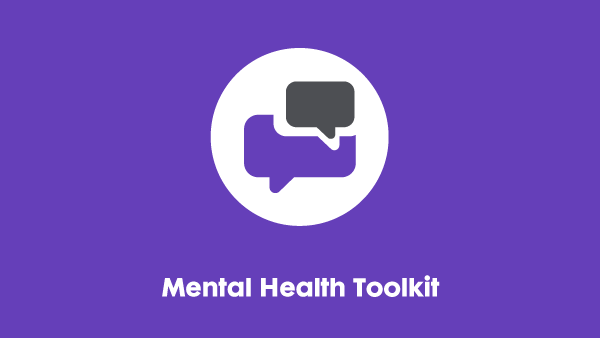Last updated: 29 October 2025
What does mental health mean?
Mental health
The World Health Organisation (WHO) defines mental health as:
“A state of mental well-being that enables people to cope with the stresses of life, realize their abilities, learn well and work well, and contribute to their community.”
It is more than simply the absence of mental disorders. People experience mental health and mental unwellness on a complex continuum that differs from person to person. This can be affected by all areas of a person’s being, including age, sex, gender identity, race, culture – and many more.
Mental ill-health
Mental ill-health is difficult to define. It not simply the presence of a mental disorder, such as depression, schizophrenia or post-traumatic stress disorder (PTSD).
A person can experience mental ill-health in a variety of ways. In this Toolkit, we talk mainly about depression, stress and anxiety. We also talk about conditions such as bipolar and PTSD.
Stress
Stress is not inherently unhealthy. Many people experience stress and cope with it comfortably.
However, when a person becomes unable to cope with their stress, it can become a form of mental ill-health. They may struggle with stress because it is too acute (high levels of stress) or chronic (for a long time). Experiencing acute or chronic stress can lead to anxiety and burnout.
Stress can also be a symptom of a mental health condition, such as PTSD.
It is impossible to quantify how much stress a person is experiencing. Instead, look at how it is affecting the person. For example, are they more emotional than usual? Are they struggling to meet deadlines, or is their work lower quality than usual?
Stress can also manifest in physical symptoms, such as aches and pains, and high blood pressure.
Managers should act to support employees experiencing stress. They may need workplace adjustments, or they may just need to know that they have the support of their manager.
Further information
- Our resource, ‘Adjustments for mental health conditions,’ has more information about what managers can do.
- See our ‘Factsheet – Stress, anxiety and depression‘ for more information.
Depression
Depression is a clinical mental illness. WHO estimates that 5 per cent of adults worldwide experience depression.
Depression is a long period of having a depressed mood or loss of pleasure in activities. It can be mild, moderate or severe.
Anyone can experience depression, though there is a link between a person’s life and their mental health. For example, women are 50 per cent more likely to experience depression than men. Significantly, someone who has had a traumatic experience may be more likely to be depressed.
Depression can cause a lack of energy, feelings of worthlessness and low mood. If depression becomes severe, it can lead to thoughts of suicide.
Managers should act to support employees experiencing depression. Depending on the severity, they may need workplace adjustments to help them manage their symptoms.
Further information
- Our resource, ‘Adjustments for mental health conditions,’ has more information about what managers can do.
- See our ‘Factsheet – Stress, anxiety and depression’ for more information.
Anxiety
The NHS defines anxiety as ‘a feeling of unease, such as worry or fear, that can be mild or severe.’
Anxiety can be a healthy reaction that we all experience without it necessarily becoming a problem. However, if it is severe enough to prevent a person from carrying out day-to-day activities, it can become a form of mental ill-health.
Someone with particularly severe anxiety might be diagnosed with an anxiety disorder.
Anxiety can also be a symptom of other mental health conditions, such as PTSD and obsessive-compulsive disorder (OCD).
Anxiety can cause mental symptoms, such as:
- Feeling tense or nervous
- Being unable to relax
- Worrying about the past or the future
- Not being able to sleep
- Difficult concentrating
- Intrusive traumatic memories.
Anxiety can also cause physical symptoms, such as:
- Changes to heart rate – faster, irregular, or more noticeable
- Feeling lightheaded or dizzy
- Headaches and chest pains
- Loss of appetite
- Sweating or feeling hot
- Breathlessness.
Managers should act to support employees experiencing anxiety. Depending on the severity, they may need workplace adjustments to help them manage their symptoms.
Further information
- Our resource, ‘Adjustments for mental health conditions,’ has more information about what managers can do.
- See our ‘Factsheet – Stress, anxiety and depression’ for more information.
Other mental health conditions
This Toolkit mainly deals with stress, anxiety and depression. However, there are other mental health conditions that can mean employees need support, such as:
- Psychosis and schizophrenia
- Bipolar disorder
- Personality disorder
- Eating disorders.
While stress, anxiety and depression can be symptoms of these conditions, there can be other symptoms that require specialist help. Employees experiencing these conditions may need support from their employer, including workplace adjustments.
Contact our Advice Service for guidance on specific questions.
If you require this content in a different format, contact enquiries@businessdisabilityforum.org.uk.
© This resource and the information contained therein are subject to copyright and remain the property of the Business Disability Forum. They are for reference only and must not be copied or distributed without prior permission.
